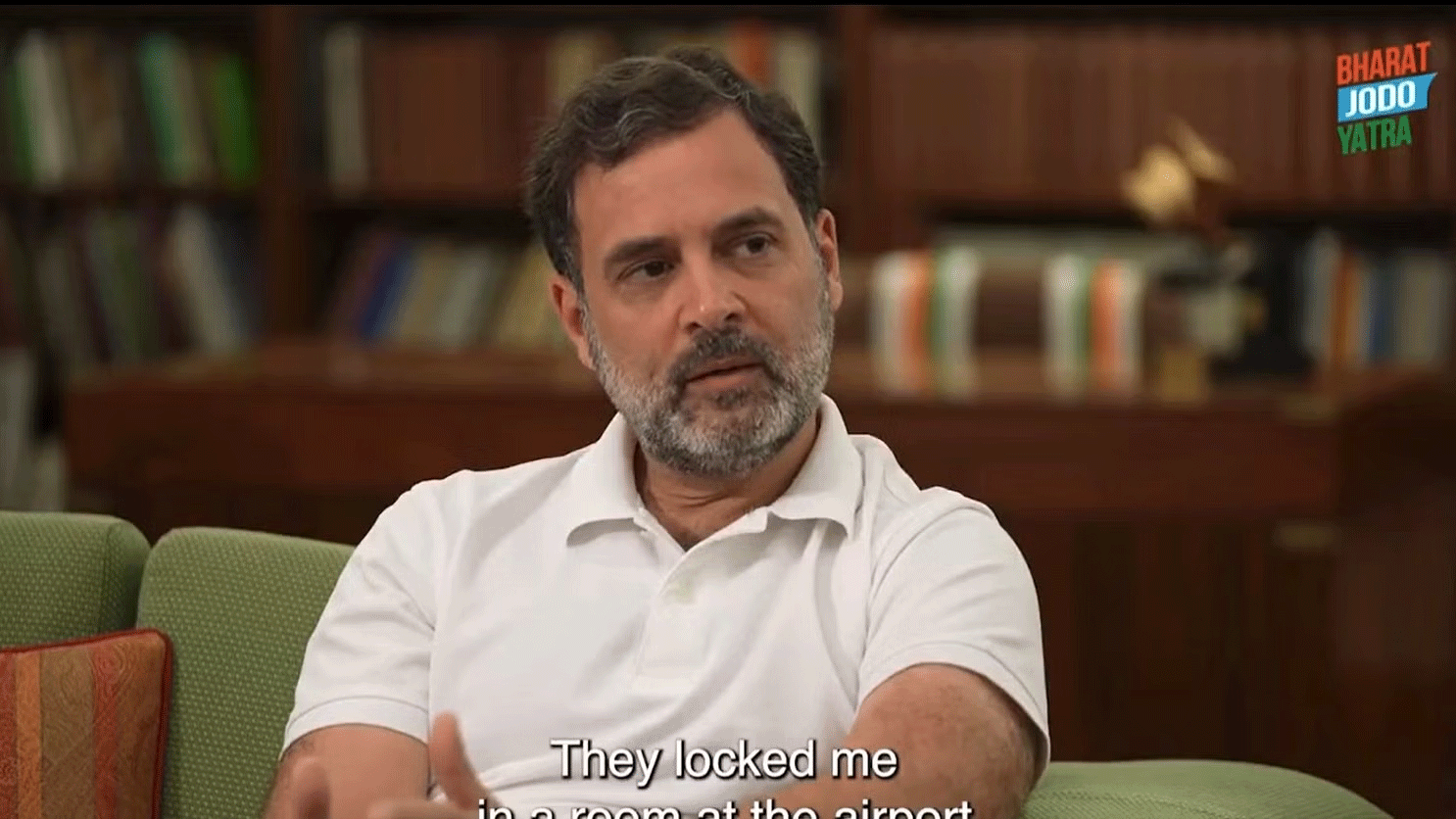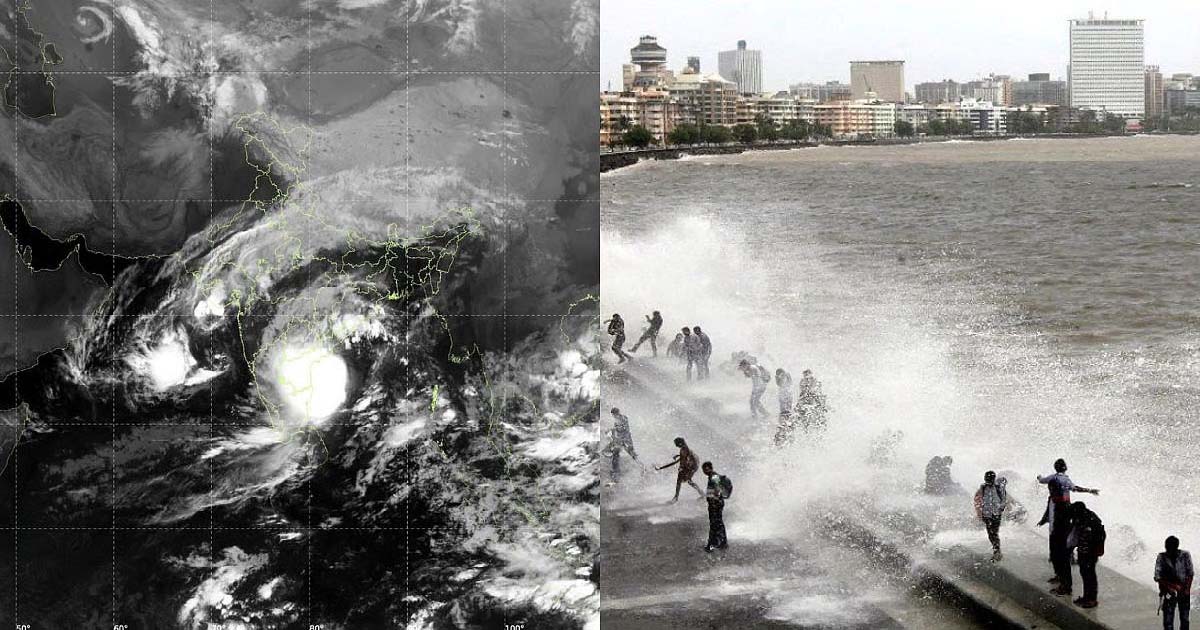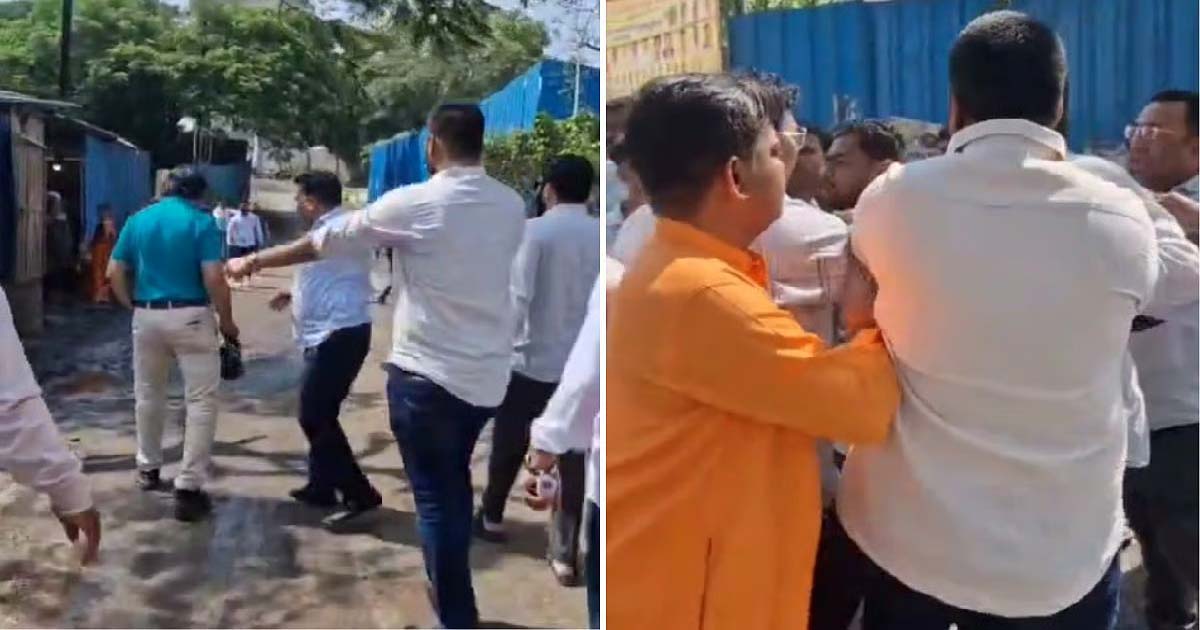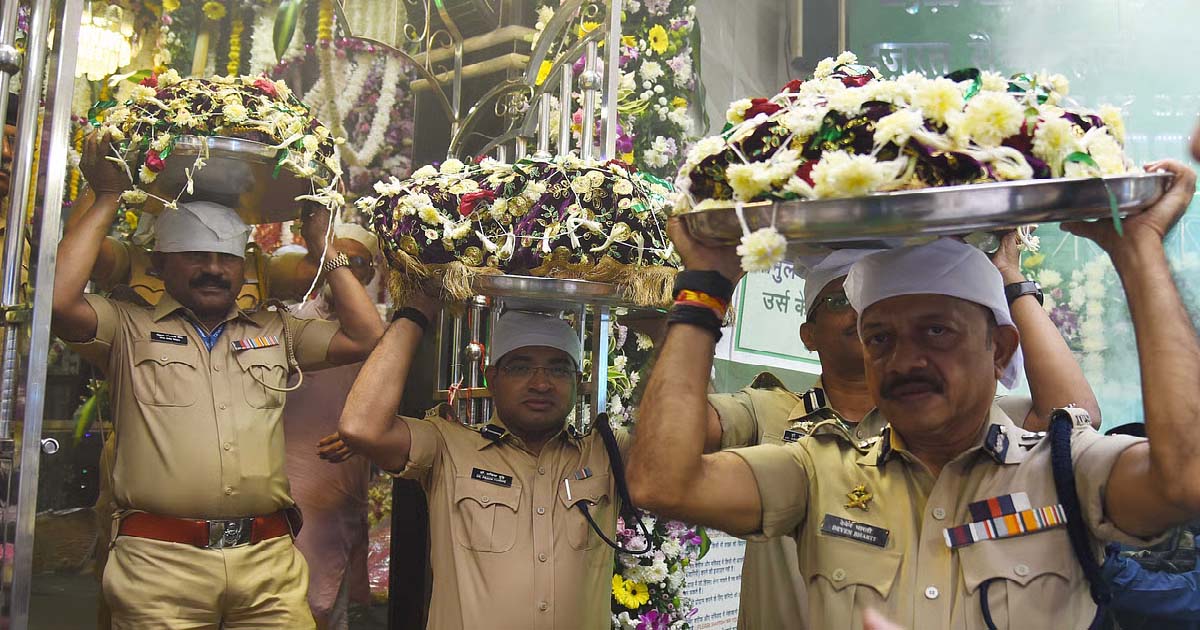National News
‘I Was Locked Inside Airport Room: Rahul Gandhi Claims He Wasn’t Allowed To Pay Tributes To Pulwama Martyrs

Congress leader Rahul Gandhi, in a video released of his interaction with former Jammu and Kashmir governor Satyapal Malik on Wednesday, claimed that he was “locked inside a room” when we went to pay tributes to the Pulwama attack martyrs at the Delhi airport in 2019.
Security people told me not to go to airport: Gandhi
“As soon as I heard about Pulwama and I found out about the martyrs being brought to the airport, I went straight to the airport. My security people told me not to go. But I said, I’m going,” Rahul Gandhi recalled in the video.
Gandhi then went on to claim that once he reached the airport, he was locked inside a room and he found the whole ‘event’ at the airport ‘distasteful’.”I went to the airport. They locked me in a room at the airport. And told me, “you can’t leave the room”. I asked them, “What does that mean?” The martyrs were brough there. Army men were there. The Prime Minister was coming. And they literally locked me and told me I can’t come out,” Gandhi said.
Event around martyrs’ deaths was ‘distasteful’: Gandhi
Gandhi went to on to add that he then asked the security ‘how can they do this?’ and ‘fought to get out of there’.
Criticising the Prime Minister of creating an ‘event’ around the deaths of martyrs, Gandhi said, “I felt as if a show was put on. What shocked me was I felt as if a big event was taking place. The Prime Minister has come and it was as if they are showing the entire nation. It was quite distasteful.”
Rahul conducts interview with Satyapal Malik
Rahul Gandhi conducted an interview with Satya Pal Malik, who served as the 10th and final Governor of the former state of Jammu and Kashmir. Malik held this position during the Pulwama attack and has been outspoken in his criticism of the administration led by Prime Minister Narendra Modi, particularly in the context of the Farmers’ Protest.
Satya Pal Malik conveyed to Rahul Gandhi that the 2019 Pulwama attack represented a failure on the government’s part.
Pulwama attack was used for electioneering: Malik
“I told two channels that it was our fault but I was asked to not say this anywhere…I thought my statements might impact the investigation, but there was no investigation. It was used for the purpose of election. On the third day, PM Modi gave his speech where he used it politically,” Satya Pal Malik said.
“Why did the Pulwama incident happen? They had asked for 5 aircraft. Had he asked me, I would have given those right away. I provided aircraft to students stuck in the snow. It is easy to get aircraft on rent in Delhi. But their application was lying for four months in the home ministry. And then it was rejected. The CRPF personnel then took the road which was known to be unsafe,” Malik added.
Satya Pal Malik also discussed the Adani Group’s ₹20,000 crore investment, a topic raised by Rahul Gandhi in Parliament. He questioned about the source of such a substantial funding secured by the group.
Malik told Rahul Gandhi that the government had not fulfilled its commitment on Minimum Support Price (MSP) due to Adani’s construction of large storage facilities and their practice of procuring crops at lower prices.
National News
How Is Cyclone Montha Impacting Weather In Maharashtra? IMD Issues Heavy Rains, Thunderstorm Across State For Next 48 Hours

Cyclone Montha, which developed from a low-pressure area over the Bay of Bengal, has intensified into a severe cyclonic storm and made landfall along the Andhra Pradesh coast on Tuesday morning.
Following its formation, weather departments in Andhra Pradesh and Odisha issued alerts as wind speeds reached up to 110 kilometres per hour, accompanied by heavy rainfall and thunderstorms across coastal regions since Monday.
While Cyclone Montha has primarily affected the eastern coast, its indirect impact is expected to be felt in parts of Maharashtra over the next two days. According to senior meteorologist Anupam Kashyapi, strong winds and thunderstorms are likely in several districts, including Pune, Mumbai, Gadchiroli, Gondia, Chandrapur, Bhandara and Nagpur. An orange alert has been issued for eastern Vidarbha, and heavy rainfall is predicted in isolated areas.
Experts say Maharashtra is not under direct threat from Montha, but its outer weather system may cause moderate to heavy rainfall in some regions. Coastal areas such as Mumbai and Konkan have been advised to remain alert as precautionary measures.
The India Meteorological Department (IMD) has warned that changing wind patterns could bring short spells of intense showers along with thunder and lightning over the next 48 hours.
In the past five years, Maharashtra has occasionally experienced the effects of cyclones formed in the Bay of Bengal and the Arabian Sea. The state witnessed major impacts from Cyclone Nisarga in 2020, which struck the Raigad coast and caused widespread damage, and from Cyclone Tauktae in 2021, which battered the Konkan region with strong winds and heavy rain. More recently, Cyclone Biparjoy in 2023 affected coastal Palghar and surrounding districts.
Compared to these earlier storms, Cyclone Montha poses less danger to Maharashtra. However, residents are urged to stay cautious as unpredictable weather patterns may lead to sudden rainfall and disruptions in some districts.
Meteorologists believe that the increasing frequency of cyclones in the Bay of Bengal and Arabian Sea highlights the growing influence of climate change on regional weather systems.
National News
Palghar: Verbal Clash Erupts Between BJP & BVA Leaders During Achole Hospital Land Survey

Vasai-Virar: A verbal dispute and scuffle broke out between BJP workers and Bahujan Vikas Aghadi (BVA) leaders, including former Mayor Rupesh Jadhav, during a survey of land for the proposed Achole hospital.
The incident took place on Friday, October 24, 2025, during an inspection by municipal officials. The corporation is planning to build a 200-bed hospital on a two-acre plot in Achole.
The long-standing land dispute was recently resolved when the Revenue Department transferred the plot (Survey No. 6/1) to the Municipal Corporation free of charge.
During the survey, BJP MLA Rajan Naik and other BJP officials were present. Former BVA Mayor Rupesh Jadhav also arrived at the site, leading to a tense confrontation. A video of the clash has since gone viral on social media, sparking political discussions.
The BJP accused Jadhav of attempting to obstruct the hospital project, claiming he had done so previously as well.
Jadhav, in turn, alleged that BJP workers were threatening him and trying to intimidate him by mentioning his encroachment on a nearby property. He also accused them of trying to intimidate a municipal official. The incident briefly caused a tense atmosphere in the area. The police are investigating the incident, as a formal complaint was filed against the BJP workers by a BVA activist regarding a social media post.
Former Mayor Rupesh Jadhav has alleged that his private property, located adjacent to the Achole hospital site, is being forcibly encroached upon. He stated that he had constructed a protective wall around his land and that he intercepted individuals attempting to trespass. Bahujan Vikas Aghadi (BVA) had initiated the process for the Achole hospital project during its term, securing primary approval and funding from the Municipal Corporation. He questioned the motives of those now trying to take credit for the project, asking where they were when the land was allegedly being encroached upon.
He accused the BJP of deliberately misleading the public by circulating a video to silence him and suppress the truth.
National News
Mumbai Police Commissioner Deven Bharti Leads Annual Sandal Ceremony At Rahman Shah Baba Dargah

Mumbai: Continuing a tradition that spans over a century, the Sandal ceremony at Rahman Shah Baba Dargah in Dongri was held with deep reverence and spiritual fervour. The event, observed annually, saw the presence of Mumbai Police Commissioner Deven Bharti, who presented the ceremonial chadar (sandal cloth) at the revered shrine.
The ritual, performed every year, symbolises not just faith but the enduring bond between the city’s civic guardians and its diverse communities.
The Sandal ceremony at the Rahman Shah Baba Dargah holds immense spiritual significance for devotees across Mumbai and beyond. The dargah, dedicated to Hazrat Abdul Rehman Shah Baba, is considered a sacred space for people of all faiths who seek blessings and inner peace.
Each year, the offering of the chadar by senior police officials, including the ACP, DCP, and Additional Commissioner, reinforces the message of peace, unity, and mutual respect. It stands as a reminder that Mumbai’s strength lies in its cultural diversity and spirit of togetherness.
Given the large crowds that throng the dargah during the Sandal procession, Mumbai Police take extensive measures to ensure the safety of all attendees. Detailed planning goes into traffic control, security deployment, and crowd management, with officers stationed around the clock.
CCTV cameras are strategically installed to monitor the surroundings and prevent any disruptions or untoward incidents. These precautions reflect the department’s commitment to ensuring that the event proceeds peacefully, while also safeguarding devotees from petty theft or disorderly conduct.
The dargah trustees actively cooperate with the authorities, following guidelines that promote discipline and devotion. This includes the prohibition of DJs and loud music, preserving the sanctity and spiritual essence of the occasion.
For countless followers, Hazrat Rahman Shah Baba is not merely a saint but a spiritual guide whose blessings are believed to bring relief, prosperity, and hope. The gathering reflects how the dargah continues to serve as a beacon of faith and emotional strength for the community.
Beyond its religious significance, the Sandal ceremony embodies Mumbai’s inclusive ethos, where people from diverse backgrounds come together in respect and celebration. The annual offering led by Commissioner Bharti and his team is not just a mark of devotion but a gesture of solidarity, echoing the city’s timeless message of unity in diversity.
This long-standing tradition continues to thrive because of the combined efforts of devotees, civic authorities, and law enforcement, making it a model of how faith and governance can coexist harmoniously.
As Mumbai grows and evolves, events like the Rahman Shah Baba Sandal remain powerful reminders of what binds the city together — faith, peace, and brotherhood. The ritual endures not merely as a religious observance, but as a living tradition that reinforces social harmony and collective well-being year after year.
-

 Crime3 years ago
Crime3 years agoClass 10 student jumps to death in Jaipur
-

 Maharashtra1 year ago
Maharashtra1 year agoMumbai Local Train Update: Central Railway’s New Timetable Comes Into Effect; Check Full List Of Revised Timings & Stations
-

 Maharashtra1 year ago
Maharashtra1 year agoMumbai To Go Toll-Free Tonight! Maharashtra Govt Announces Complete Toll Waiver For Light Motor Vehicles At All 5 Entry Points Of City
-

 Maharashtra1 year ago
Maharashtra1 year agoFalse photo of Imtiaz Jaleel’s rally, exposing the fooling conspiracy
-

 National News1 year ago
National News1 year agoMinistry of Railways rolls out Special Drive 4.0 with focus on digitisation, cleanliness, inclusiveness and grievance redressal
-

 Maharashtra12 months ago
Maharashtra12 months agoMaharashtra Elections 2024: Mumbai Metro & BEST Services Extended Till Midnight On Voting Day
-

 National News1 year ago
National News1 year agoJ&K: 4 Jawans Killed, 28 Injured After Bus Carrying BSF Personnel For Poll Duty Falls Into Gorge In Budgam; Terrifying Visuals Surface
-

 Crime1 year ago
Crime1 year agoBaba Siddique Murder: Mumbai Police Unable To Get Lawrence Bishnoi Custody Due To Home Ministry Order, Says Report












